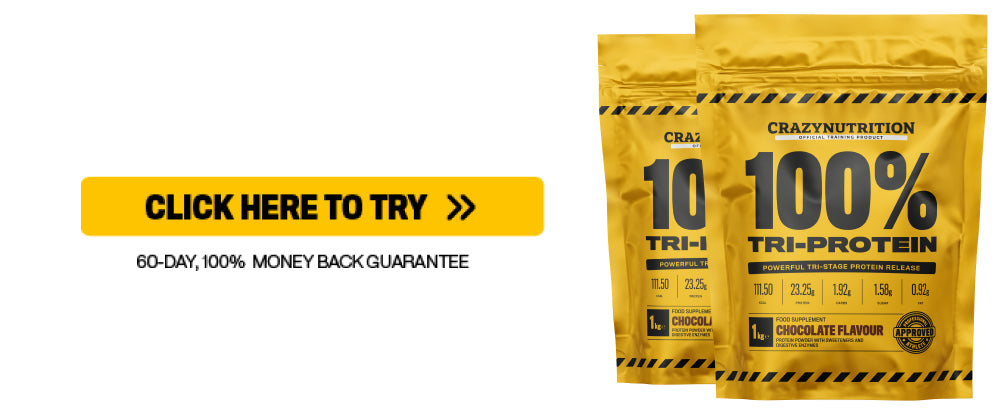Get your protein cheatsheet |
It all seemed so straightforward. You bought your protein powder and a shaker and read the instructions, but you’ve hit a stumbling block.
Just when it all seemed so simple, you now have the dilemma of whether or not to take your whey protein with milk or water.
It’s an age-old question and has been the subject of many a discussion in the gym, so let’s get down to it and find out precisely what the score is.
You’ve set yourself a goal and want to hit it as soon as possible, so let’s get our priorities in order and find out which mix of protein shakes will get you there the quickest.
This blog explores the pros and cons of mixing your protein shake with water and milk, to help you figure out which one is best for you and your goals.
Protein shake with water vs. milk: what’s the difference?
Whether mixing protein powder with milk or water, you are using the same scoop of protein, so don’t worry about it too much, as you’ll still be consuming the same amount of protein.
But there are several things to consider before deciding which liquid you should go with, as they will taste different and may impact how the protein is absorbed into your body.
So let’s explore the options and ensure you set yourself on the right footing.
Whey protein shake with water…
Water is a good (cheap) and easy way to mix your protein powder, and there are pros and cons to it.
Pros of taking protein powder with water:
If you are following a strict diet and looking to lose weight, it’s best to go with the zero-calorie, water option.
You’ll get around 100 calories per scoop of whey protein with little carbs or fat, so if you’re dieting, it’s important not to add to this via milk. Two cups of low-fat milk contain around 150-200 calories; if you use water to mix whey protein, you will not consume those extra calories and have to spend extra time trying to burn them off.

Water is also best for lean muscle mass rather than bulk muscles.
In addition, the protein will be absorbed in your body more quickly if you take it with water which means that your muscles will repair much faster. It’s a good idea to mix with water if you are taking the protein before a workout - as it will help fuel your workout.
Water is naturally the way to go if you are lactose intolerant or milk gives you stomach discomfort. You need to feel up to the task if you’re working out.
Cons of taking protein powder with water:
Depending on your choice of whey powder, mixing protein powder with water may not help keep you as full for as long.
It also might not taste quite as delicious (although our Crazy Nutrition protein powders are designed to taste great either way).
Whey protein shake with Milk…
A popular alternative to water is mixing your protein powder with milk, but again there are some things to consider.
Pros of taking protein powder with milk:
For those looking to build significant muscle mass, taking protein with milk is the better option. It’s especially helpful for beginners who want to gain weight.
Milk is 80% casein and 20% whey, two of the best protein sources. Therefore, mixing whey protein powder with milk will increase the protein intake and fast-track your muscle repair and growth. In addition, it will also give you a balanced nutritional consumption.

A cup of milk contains 8 grams of protein which will be added to your protein mix when taking it with protein powder. It’s no surprise then that milk is the choice of the hard muscle-gainers as you get a protein boost and essential carbs and fats to help you along the way. It will also boost your energy to get your workout done.
Plus, milk is the best option if you want a slower release of protein and nutrients to aid recovery and better hydration. So taking protein shakes after a late-night workout will help keep you full until morning.
Plus, many people find protein shakes with milk more delicious, and enjoyable to drink.
Cons of taking protein powder with milk:
As we said, it can help you put on weight so it’s not the best option if you are on a calorie-controlled diet.
Plus if you have an intolerance to milk, seek out other options; Soya, oat or almond milk are good choices for those looking for an alternative to cow’s milk. Soy milk typically contains around 8g of protein per cup, and oat milk, 4g. If you have no issues with lactose intolerance but are calorie counting, skimmed milk is an option, but water will better.
Protein shake: water vs. milk; which one should you take?
So, which one is right for you?
Water is the way to go if your protein shake is all about the protein (not carbs and fat) for you. It’s the right choice if you're watching your calorie intake or are looking for leaner muscle growth and of course, if you are lactose intolerant.
However, milk is the way to go with your protein shake if you are not on a strict calorie-controlled diet and want to gain bulk muscle mass. It will also give you a slower release of proteins and nutrients. Milk contains protein, and more protein means more muscle mass. Therefore, it will give you added protein and essential carbs and fats, contributing to an extra energy boost.
Either way, you will still get a boost of energy, and we find that most people like to mix it up throughout the week depending on what they need.
To get your hands on our Tri-protein you can buy it from here.
Related Articles




